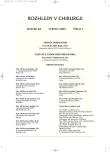The Molecular Screening of the Stool for the Colorectal Carcinoma
Molekulární screening stolice pro kolorektální karcinom
Úvod:
V současné době používané screeningové metody pro detekci kolorektálního karcinomu jsou založené na vyšetření přítomnosti okultního krvácení ve stolici, dále na vyšetření endoskopickém a irigografickém. Je snaha nalézt neinvazivní metody s vysokou citlivostí a specifitou, vhodné k masivnímu testování populace.
Metodika:
Identifikace molekulárních změn v kolonocytech získaných ze stolice pacientů může být slibným nástrojem pro takovýto screening. Detekce mutací v genech APC, K-ras, DCC, p53 a „dlouhá“ DNA mohou sloužit k časnému odhalení kolorektálního karcinomu ze vzorků stolice. Testování kombinace uvedených markerů v jednom testu zvyšuje citlivost a specifitu vyšetření, avšak zároveň i jeho cenu. Bylo by tudíž výhodné najít jednotný marker. Tím by mohl být nukleární faktor-kappaB (NF-κB) stanovovaný v kolonocytech uvolněných do stolice.
Závěr:
Molekulární testování stolice za účelem detekce kolorektálního karcinomu by mohlo být slibnou screeningovou metodou tohoto onemocnění. Pro ověření prvotních výsledků jsou však nezbytné velké, multicentrické studie.
Klíčová slova:
kolorektální karcinom – stolice – screening – mutace – DNA
Authors:
R. Vobořil 1,2; J. Weberová 2; J. Dvořák 3
Authors‘ workplace:
Chirurgická klinika, 3. LF UK a FNKV Praha, přednosta doc. MUDr. J. Fanta, DrSc.
1; Oddělení buněčné a molekulární biologie Centra biomedicínských oborů
3. LF UK a FNKV Praha, přednosta doc. RNDr. J. Kovář, DrSc.
2; Klinika onkologie a radioterapie, FN Hradec Králové, přednosta doc. MUDr. J. Petera, PhD.
3
Published in:
Rozhl. Chir., 2005, roč. 84, č. 6, s. 281-285.
Category:
Monothematic special - Original
Overview
Background:
Current screening methods of colorectal carcinoma are based on examination of occult bleeding in the stool, and further on endoscopic and irrigographical (barium enema) examinations. Population-based non-invasive screening method having high sensitivity and specificity is needed.
Methods:
Detection of molecular alterations in colonocytes from the stool may be a promising new diagnostic tool for such screening. Determination of mutations in APC, K-ras, DCC, p53 genes and „long“ DNA may serve for early detection of colorectal cancer from stool samples. Multi-target DNA-assays employing all these markers suggest high sensitivity and specificity, unfortunately also expensiveness. Therefore finding a marker characteristic for all tumor cells would be desirable. Nuclear faktor-kappaB (NF-κB) could be such marker suitable for determination in colonocytes shed into the stool.
Conclusion:
Molecular testing of stool for early detection of colorectal cancer may be a promising screening method for this disease. Large multicenter trials are required to validate results obtained from preliminary clinical studies.
Key words:
colorectal carcinoma – stool – screening – mutation – DNA
Labels
Surgery Orthopaedics Trauma surgeryArticle was published in
Perspectives in Surgery

2005 Issue 6
- Possibilities of Using Metamizole in the Treatment of Acute Primary Headaches
- Metamizole at a Glance and in Practice – Effective Non-Opioid Analgesic for All Ages
- Metamizole vs. Tramadol in Postoperative Analgesia
-
All articles in this issue
- The Endovascular Treatment of the Aortic Trauma
- An Inflammatory Pseudotumor of the Liver Surrounding a Foreign Object
- The Molecular Screening of the Stool for the Colorectal Carcinoma
- A Fistule of the Anus in the Crohn‘s Disease
- Internal Fixation of Intracapsular Femoral Neck Fractures
- Erectile Dysfunction after Traumatic Pelvic Injury
- The Technique of Securing Sentinel Lymphonodes in Tumors in the Distal Oesophagus and the Stomach Region
- The Intraabdominally Located Mesh in the Laparotomic Management of Major Hernias
- The Long-term Results of Adjustable Gastric Bandages
- Perspectives in Surgery
- Journal archive
- Current issue
- About the journal
Most read in this issue
- A Fistule of the Anus in the Crohn‘s Disease
- Internal Fixation of Intracapsular Femoral Neck Fractures
- The Intraabdominally Located Mesh in the Laparotomic Management of Major Hernias
- Erectile Dysfunction after Traumatic Pelvic Injury
